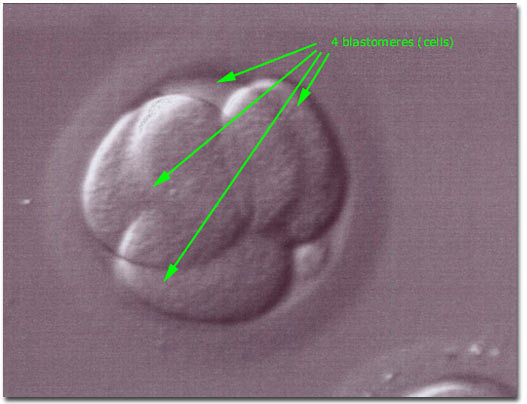|
4 Cell Human Embryo

Photomicrograph (microscopic view) of a 4 cell human embryo that can be graded (by the embryologists culturing it), in preparation for In Vitro Fertilization and Embryo Transfer. Normally, one finds a two cell embryo between about 22-44 hours after insemination and a four cell embryo between about 36-50 hours after insemination.
Several different grading systems have been developed. One embryo grading system that is commonly used classifies the embryos into 5 grades. Grade 1 (perfect morphology) has blastomeres (cells) of equal size and no cytoplasmic fragmentation (pieces or fragments of cells). Grade 2 has blastomeres of equal size with minor cytoplasmic fragmentation or blebs (that are smaller than the blastomeres). Grade 3 has blastomeres of distinctly unequal size with few cytoplasmic fragments. Grade 4 has blastomeres of equal size with significant cytoplasmic fragmentation. Grade 5 has few blastomeres of any size and severe or complete fragmentation of the cytoplasm.
The grading systems for human eggs and embryos are based on structural (visible) features and do not reliably predict reproductive potential. Therefore, a particular lower grade (less normal appearing) embryo may result in (uterine) implantation (a pregnancy) while a particular higher grade embryo may not be able to implant (has less reproductive potential).
|

|